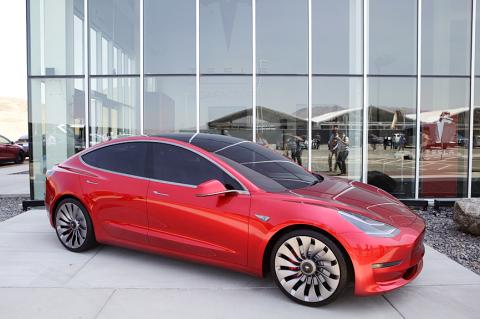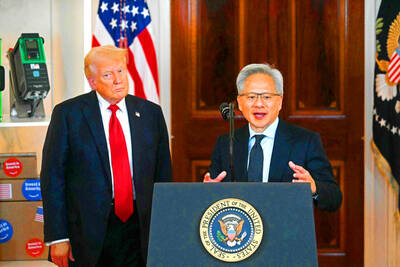Taiwanese manufacturers are preparing to seize business opportunities that are likely to arise with the arrival of US-based electric car maker and vendor Tesla Motors Inc, which is expected to build charging stations in Taiwan, market sources said on Saturday.
Among the interested electric car component makers are electric vehicle harness maker BizLink Holding Inc (貿聯), electrical terminal supplier K.S. Terminals Inc (健和興端子) and power system management supplier Delta Electronics Inc (台達電), the sources said.
Tesla on July 4 announced its plans to enter the Taiwanese market.

Photo: Bloomberg
It has opened a pop-up store at the Shin Kong Mitsukoshi department store in Taipei’s Xinyi District (信義) to showcase the technology and design behind its electric vehicles.
The store is to stay open through Aug. 31, with staff answering questions about the electric cars and how to charge their batteries.
Buyers in Taiwan can pre-order Tesla Model S cars on the vendor’s Taiwan Web site, with the first delivery expected to come in the first quarter of next year.
Taiwan is the sixth market in the Asia-Pacific region into which Tesla has made inroads.
The company said that it will set up a regional service center and charging network in Taiwan to meet the needs of local buyers.
The sources said that Tesla plans to set up more than 10 charging stations in Taiwan, which has prompted firms like Delta Electronics to pay attention to potential business from Tesla.
They said Delta Electronics is expected to take the lead in power management solutions for Tesla’s charging stations, as the Taiwanese firm has long been exploring the global electric car market with a wide range of products to meet demand from its various clients in the US, Europe, Japan and China.
However, the sources said that while the government has pushed for the development of the electric vehicle industry, local construction and security regulations have failed to catch up with the developments and efforts to set up charging stations could be hampered.
The sources added that the government should introduce incentives to encourage electric car component makers to join the efforts to build a charging station network in Taiwan.
Tesla runs 681 charging stations, called superchargers, around the world to provide charging services for free, and the stations are mostly near restaurants, shopping malls and Wi-Fi hot spots.
Tesla cars can drive 270km on a 30-minute charge, according to the company.

Taiwan Semiconductor Manufacturing Co (TSMC, 台積電) last week recorded an increase in the number of shareholders to the highest in almost eight months, despite its share price falling 3.38 percent from the previous week, Taiwan Stock Exchange data released on Saturday showed. As of Friday, TSMC had 1.88 million shareholders, the most since the week of April 25 and an increase of 31,870 from the previous week, the data showed. The number of shareholders jumped despite a drop of NT$50 (US$1.59), or 3.38 percent, in TSMC’s share price from a week earlier to NT$1,430, as investors took profits from their earlier gains

AI TALENT: No financial details were released about the deal, in which top Groq executives, including its CEO, would join Nvidia to help advance the technology Nvidia Corp has agreed to a licensing deal with artificial intelligence (AI) start-up Groq, furthering its investments in companies connected to the AI boom and gaining the right to add a new type of technology to its products. The world’s largest publicly traded company has paid for the right to use Groq’s technology and is to integrate its chip design into future products. Some of the start-up’s executives are leaving to join Nvidia to help with that effort, the companies said. Groq would continue as an independent company with a new chief executive, it said on Wednesday in a post on its Web

CHINA RIVAL: The chips are positioned to compete with Nvidia’s Hopper and Blackwell products and would enable clusters connecting more than 100,000 chips Moore Threads Technology Co (摩爾線程) introduced a new generation of chips aimed at reducing artificial intelligence (AI) developers’ dependence on Nvidia Corp’s hardware, just weeks after pulling off one of the most successful Chinese initial public offerings (IPOs) in years. “These products will significantly enhance world-class computing speed and capabilities that all developers aspire to,” Moore Threads CEO Zhang Jianzhong (張建中), a former Nvidia executive, said on Saturday at a company event in Beijing. “We hope they can meet the needs of more developers in China so that you no longer need to wait for advanced foreign products.” Chinese chipmakers are in

POLICY REVERSAL: The decision to allow sales of Nvidia’s H200 chips to China came after years of tightening controls and has drawn objections among some Republicans US House Republicans are calling for arms-sale-style congressional oversight of artificial intelligence (AI) chip exports as US President Donald Trump’s administration moves to approve licenses for Nvidia Corp to ship its H200 processor to China. US Representative Brian Mast, the Republican chairman of the US House Committee on Foreign Affairs, which oversees export controls, on Friday introduced a bill dubbed the AI Overwatch Act that would require the US Congress to be notified of AI chips sales to adversaries. Any processors equal to or higher in capabilities than Nvidia’s H20 would be subject to oversight, the draft bill says. Lawmakers would have